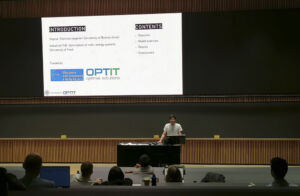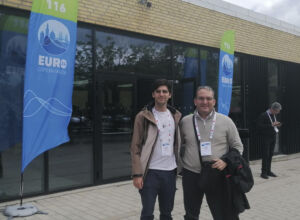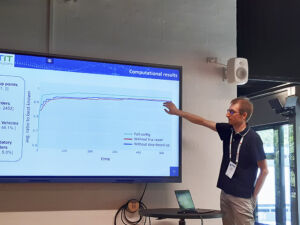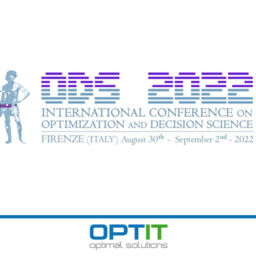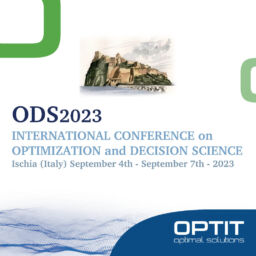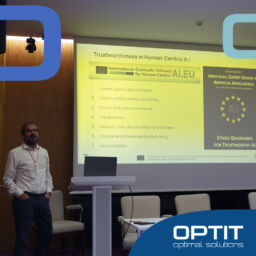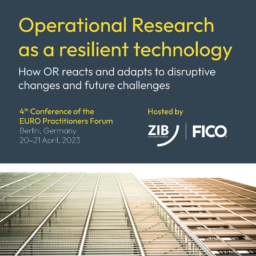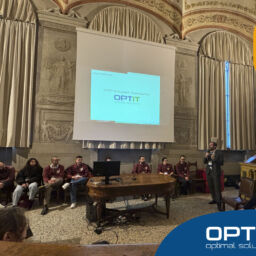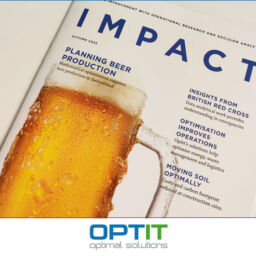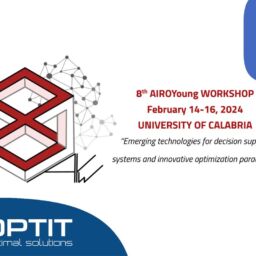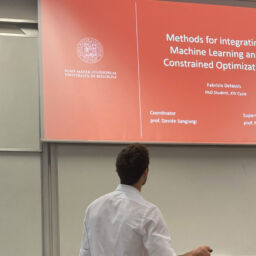Optit participated again this year in the EURO conference on operational research, a key event to discuss the latest developments in operational research (OR), such as the evolution of machine learning (ML) and artificial intelligence (AI). The conference offers participants the opportunity to share knowledge and innovations, and this year there were over 200 sessions.
The 33rd edition of the conference was held in Copenhagen, in collaboration with DORS, the Danish Operational Research Society, and attracted nearly 3000 participants from 68 countries.
Optit participated in three presentations covering three highly relevant topics:
– Optimization of logistics for an automotive transporter;
– Optimal planning of multi-energy systems;
– Waste collection planning through the implementation of a dedicated optimization engine.
We are thrilled to have participated in the EURO conference in Copenhagen, where hundreds of researchers from around the world gathered to tackle practical societal problems through operational research. In a time of great uncertainty and crisis, this experience has strengthened our faith in knowledge and innovation.
Below is the introduction to the various presentations.
Andrea Bettinelli presented: Optimization of auto-carrier routes: a real-world case study in Italy.
Autors: Daniele Ferone, University of Naples “Federico II”. Andrea Bettinelli, Optit
Bertani Trasporti Spa is one of Italy’s leading players for logistics services in the automotive sector. One of the critical tasks in their planning process is the definition of the delivery trips for their fleet of auto-carriers. The problem consists in selecting the best subset of orders that will be served the next day and building a set of optimal routes to deliver them. The routing of the auto-carriers must take into account constraints related to the loading of the vehicles on the carriers. The goal is to use the carriers in the most efficient way (at present there is more demand than transport capacity). This means that we must saturate auto-carriers capacity and create trips visiting few and geographically close delivery points. At the same time we have to minimize the orders not delivered on time. In this work we propose a heuristic method to build optimized routes, based on an Adaptive Large Neighborhood Search (ALNS) scheme, where loading constraints combine explicit rules with coefficients dynamically learned from historical data and feedback from expert planners.
Keywords: Vehicle Routing, Practice of OR, Combinatorial Optimization
Anibal Baradei presented: Multi energy mixed integer linear programming model for generation and network expansion planning with coupled electricity and heat sectors considering renewable sources
Authors: Anibal Baradei, Aldo Bischi, University of Pisa; Matteo Pozzi e Angelo Gordini, Optit;
Multi energy systems optimal planning main challenge is the equilibrium between model accuracy and computational feasibility. This is due to the need of large-scale, nationwide, generation and transmission expansion model that incorporates aspects such as optimal units and storage scheduling, space constraints, and renewable energy sources availability. Furthermore, the deep decarbonization needs of the future energy systems implies to have coupled energy infrastructures, e.g. electric, heat, gas, and long duration energy storage including all the possible interactions between them through multi year periods, yields an increasing model complexity. It is modeled as a mixed integer linear problem and aims to include all the key features of state-of-the-art models obtainable from a linear formulation. The objective function is the minimization of the overall system cost, and it includes investment, maintenance, network expansion, transmission hourly prices, energy regulations, and fuel prices. The model has been implemented in Python language using Gurobi solver with an hourly time step. It can tackle in few minutes more than a year depending on the problem size: a yearly instance of 200 nodes yielded about 320 million continuous and tens of binary variables. The model flexibility enabled to run various sensitivity analyses to tackle uncertainty considering fuel availability, natural resources, different technologies, regulations, load profiles and time evolution.
Keywords: Capacity Planning, Energy Policy and Planning, Programming, Mixed-Integer
Annarita De Maio from University of Calabria presented a paper from the experience of an Optit client: A Roll-On Roll-Off Vehicle Routing Problem for Industrial Waste Collection: A Case Study in Northern Italy
Annarita De Maio, Francesca Vocaturo, University of Calabria, Stefano Bortolomiol, Antonio Napoletano, Optit.
This work tackles the issue of waste collection for a company situated in the Northen Italy. The project aimed to streamline waste collection planning through the implementation of a dedicated optimization engine. This problem involves collecting various types of waste from multiple customers, which then need to be transported to specific landfills. Compatibility constraints arise from the nature of the waste, the vehicle type, or the container loaded onto the vehicles. The collection process can unfold in various ways: containers may be loaded directly onto the waste management company’s trucks and then returned empty to the original customer, or the loads (always equivalent to full containers) can be transferred onto the containers attached to the trucks and transported to the landfill. Moreover, the service must adhere to specific time windows associated with depot, customers, and landfills. The problem is defined as a roll-on roll-off pick-up and delivery problem with time windows. Given its complexity, a three-phase covering heuristic is developed. In the first phase, the algorithm clusters customers into subgroups; in the second phase, route generation takes place, while in the third phase, a modified version of the Chvátal heuristic is implemented to determine a feasible solution, with the aim of minimizing costs and ensuring the maximum coverage of served customers. The approach was tested using real data instances provided by the partner company.
Keywords: Vehicle Routing, Industrial Optimization, Reverse Logistics / Remanufacturing
For info : https://euro2024cph.dk/


